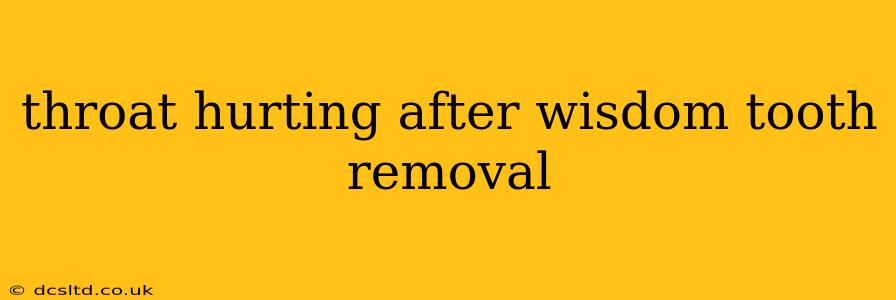Having your wisdom teeth removed is a common procedure, but recovering can be uncomfortable. Many people experience a sore throat after wisdom tooth extraction, and understanding why this happens, how to manage the discomfort, and when to seek professional help is crucial for a smooth recovery. This comprehensive guide will address common concerns and provide valuable information to help you navigate this phase of your healing journey.
Why Does My Throat Hurt After Wisdom Tooth Removal?
A sore throat after wisdom tooth extraction isn't unusual. Several factors contribute to this post-operative discomfort:
-
Irritation from the surgery: The surgical instruments, sutures (stitches), and the general trauma to the mouth and throat during the procedure can cause irritation and inflammation. This leads to a scratchy or painful feeling in the throat.
-
Swelling: Swelling in the mouth and throat is a common post-operative response. This swelling can put pressure on the throat muscles and nerves, leading to pain and discomfort.
-
Dry mouth: Breathing through your mouth (often necessary after surgery) can dry out the throat, exacerbating the pain and making it feel scratchy.
-
Blood clots: While the formation of blood clots is essential for healing, a large blood clot can sometimes irritate the throat.
-
Infection: Though less common, a throat infection can develop as a result of bacteria entering the mouth during or after surgery. This is often accompanied by other symptoms such as fever and pus.
-
Referred pain: Sometimes, the pain you feel in your throat is actually referred pain originating from the surgical site itself. The nerves in your mouth and throat are interconnected, so pain from your jaw or extraction site might be perceived as a sore throat.
How Long Does Throat Soreness Last After Wisdom Tooth Removal?
The duration of throat soreness varies significantly depending on the individual and the complexity of the surgery. Generally, you can expect some discomfort for a few days, but for most people, the worst of it subsides within 3-7 days. However, persistent or worsening pain beyond a week warrants a visit to your dentist or oral surgeon.
What Can I Do to Relieve Throat Pain After Wisdom Tooth Extraction?
Several home remedies and over-the-counter medications can help soothe your throat:
-
Saltwater gargles: Gently gargling with warm salt water (1/4 teaspoon salt in 8 ounces of water) can help cleanse the mouth and reduce inflammation.
-
Rest: Getting plenty of rest allows your body to focus on healing. Avoid strenuous activities.
-
Hydration: Drinking plenty of fluids, particularly water, will help prevent dry mouth and keep your throat moist. Avoid using straws, as sucking can dislodge blood clots.
-
Ice packs: Applying ice packs to your jaw and cheek can help reduce swelling and pain.
-
Over-the-counter pain relievers: Ibuprofen or acetaminophen can help manage pain and inflammation. Always follow the dosage instructions on the label.
-
Soft foods: Eat soft, easily digestible foods to avoid further irritation. Avoid hot or acidic foods and drinks.
-
Throat lozenges or sprays: Over-the-counter throat lozenges or sprays containing menthol or other soothing agents can provide temporary relief.
When Should I Worry About Throat Pain After Wisdom Tooth Removal?
While some throat soreness is expected, you should contact your dentist or oral surgeon immediately if you experience:
-
Severe or worsening throat pain: Pain that doesn't respond to over-the-counter pain relievers or home remedies.
-
High fever: A fever (above 101°F or 38.3°C) could indicate an infection.
-
Difficulty swallowing: Significant difficulty swallowing could be a sign of a more serious complication.
-
Excessive bleeding: While some bleeding is normal, excessive bleeding or bleeding that doesn't stop after several hours is a cause for concern.
-
Pus or discharge: The presence of pus or unusual discharge from the surgical site is a sign of a potential infection.
-
Persistent swelling: Swelling that increases significantly after the initial few days, rather than subsiding.
Is it Normal to Have a Sore Throat After Wisdom Teeth Removal?
Yes, some degree of throat soreness is quite common following wisdom tooth extraction. The surgery involves manipulation of tissues in the mouth and throat, leading to irritation. However, the severity and duration of the discomfort are important factors to monitor. If the pain is severe, persistent, or accompanied by other concerning symptoms, seeking professional medical advice is crucial. Remember, prompt attention can prevent complications and ensure a smoother recovery.
